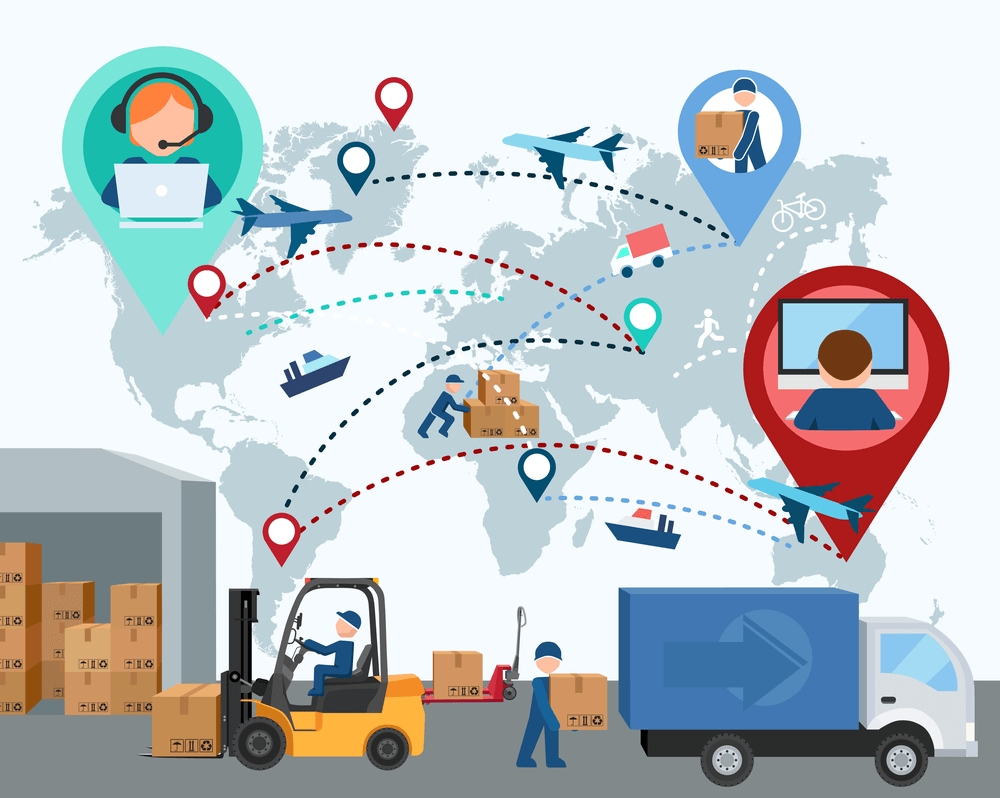
In commerce, supply chain management is essential for the streamlined handling of the production flow from the point of production to that of consumption. Logistics management is a crucial aspect of the supply chain. It helps to maximize quality, scalability, delivery, profitability, and customer satisfaction. You also might want to consider a last mile delivery for your business. To know more about this check out goshare last mile delivery.
The logistics management process’s primary objective is to transport the inventory in a supply chain effectively and efficiently. This helps to achieve the requisite customer service requirements cost-effectively. The entire supply chain process involves product development, sourcing, production, and dispatching of the products/services. And all these supply chain logistics can be easily managed with the help of a technology-based system for shipments around the world or across town. Seamless coordination in the storage and movement of the goods, services, and associated data is key to logistics management.
Logistics strategy reduces the expense and incidental charges on capital assets such that only the most critical assets are required in the process. For proper planning, implementation, and control of the flow of goods, logistics management software can add leverage to your supply chain operation. Choosing the best logistics management software can help with the material handling capacity of your company. Timely and efficient logistics operation is extensively helpful in bringing down the costs and in maximizing productivity.
Logistics management software has triggered exponential growth in the logistics market. The global logistics market is anticipated to register a CAGR of 3.48% from 2016 to 2022 to attain a market size of around $12,256 billion by 2022. By aligning and automating the supply chain process, logistics management software can help meet your company’s miscellaneous requirement, be it inventory management, warehouse operation, or shipping management. However, choosing the right software can prove to be a daunting task. Here are the eight factors that you need to consider without fail while choosing Logistics Management Software.
Order Management
Order management capacity of logistics software enables the company to automate the order fulfillment procedure. Management of orders is not limited to just receiving and processing them. The order management cycle needs to be integrated into the logistics management software, from organizing the inventory databases to collecting the related information, processing the orders, enabling the fulfillment system, and streamlining the returns to the appropriate fulfillment system. This will help to reduce the time taken in the order-to-cash cycle by improving the order processing efficiency.
Inventory Management
A systematic approach is required in the logistics management operation to source, store, and sell the inventory—both raw materials and finished goods and services. Effective inventory management capability of the logistics management software helps to track product availability. It also helps manage and supervise the purchases, maintenance, and regulation of the products and order fulfillment. The inventory management platform makes it easier to monitor and control the inventory quickly.
Warehouse Management
Warehouse management solution of the logistics software enables you to control the day-to-day operations, like shipping, receiving, put-away, and picking of products. It ensures the optimum management of the warehouse or distribution center. The software also helps to plan, organize, staff, direct, and control the usage of resources. This software’s warehouse management capabilities help in the storage and movement of materials within and outside the warehouse. This can boost the economic growth of the company.
CartonCloud is a fully automated transportation and warehouse management software. It is the top choice for organizations that are looking to effectively store, pack, and deliver products. CartonCloud can handle multiple warehouses simultaneously.
Transport Management
The logistics software’s transportation management platform enables the company to plan and manage the flow of goods effectively. This is done by maximizing the use of resources while keeping costs low.
This platform helps organizations plan, execute, and optimize the flow of goods and services from the production point to consumer consumption. TMS also makes sure that the shipment process is compliant with the current fleeting standards.
Logistics Analytics
Logistics software should incorporate the data analytics tool to evaluate logistics operational efficiency. Analyzing the functional metrics, shipping history, and inventory data can help the companies optimize, simulate, and draw conclusions to manage optimal growth resources.
Risk Management
The risk management feature of the logistics software is essential to control threats to a company’s assets. It aims to develop strategic goals for the logistics company to move and manage the goods and services safely. The risk management platform of the software proactively identifies, assesses, and mitigates supply chain risks.
Scalability
A scalable logistics software will accommodate greater loads if the company grows in number or size. It will be able to meet the demands of the industry. Hence, scalable software will be a long-term investment for your company.
Customer Support
Logistics software should have the appropriate tools to facilitate an enhanced customer support service. Such tools will help you meet your customer’s demands on time, hence improving your business’s productivity. Integrating tools like automation, chatbots, and virtual assistants will help you to extend quality customer service.
To Conclude:
Logistics management software can be deployed to manage the inventory, order, and shipment of the supply chain process. Fieldwork management, sales productivity, customer support service, and financial administration can be streamlined with this software’s help.